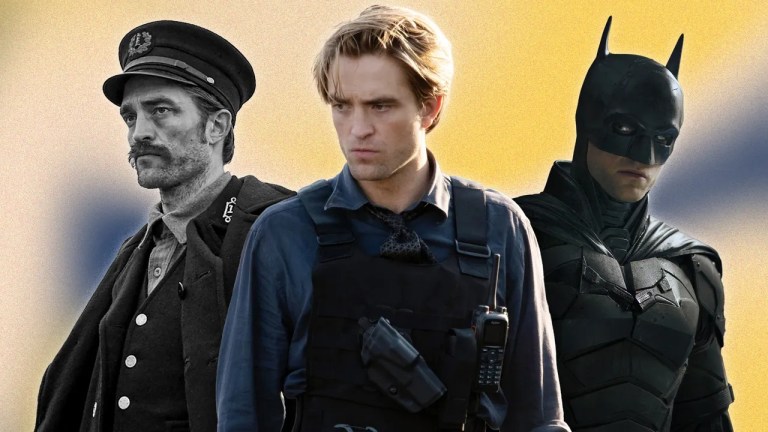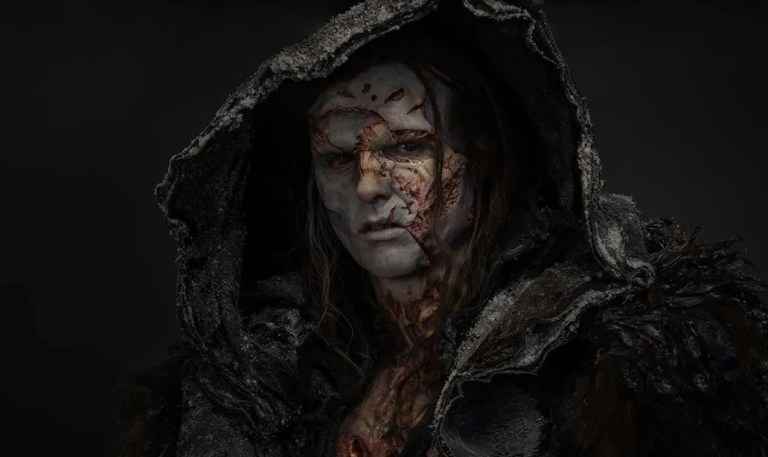
Our Favorite and Least Favorite Characters From Netflix’s ‘The Fall of the House of Usher’
By ![]() Josh Lezmi
Josh Lezmi
Some of these Ushers are simply irredeemable…
The Fall of the House of Usher is horror auteur Mike Flanagan’s latest spooky series and, like The Haunting of Hill House and Bly Manor, it pulls from the works of yet another famed gothic storyteller: Edgar Allan Poe. Poe’s “The Fall of the House of Usher” serves as the series’ narrative framework — the primary story stringing the episodic installments together, each of which adapts a different classic Poe tale with a 21st-century spin; “The Tell-Tale Heart,” “The Raven,” “The Black Cat,” and more all feature in the eight-episode miniseries.
The series follows Roderick Usher, the greedy and morally bankrupt head of Fortunato Pharmaceuticals, who faces the consequences of catalyzing the opioid epidemic when his children begin spontaneously dying one after the next. The series, via each bloody massacre of yet another Usher, each didactic monologue from the consequence-bearing Verna (Carla Gugino), and each foreboding raven is not subtle about its anti-capitalistic message. Unbridled ambition: bad. Generational wealth: not earned, but seized by trampling on innocents as you ascend a ladder covered in blood. Thus, there aren’t many characters here that are easy to love, but there are a few worthy of appreciation — whether via their morally superior fortitude or their gloriously deviant disposition. Others…well, they’re just terrible all around. So, here are our favorite and least favorite characters from The Fall of the House of Usher.
Spoiler Warning for The Fall of the House of Usher
Favorite: Lenore Usher (Kyliegh Curran)
Lenore is one of the show’s only empathetic and morally driven characters. She is one of, if not the only Usher-by-blood who is uncomfortable with the terrible sacrifices this family has made for Fortunato Pharmaceuticals. She would rather leave a life of opulence behind for a life of purpose and connection. It’s hard not to love Lenore, as we watch her sit by her scorched mother’s bedside, waiting patiently for her to return to health. Lenore is a bright force in a pool of soulless money-hungry leaches, all suckling from the teet of a company responsible for millions of deaths.
Least Favorite: Mr. Longfellow (Robert Longstreet)
Though Mr. Longfellow is only present in The Fall of the House of Usher for a few early episodes, he manages enough screen time to garner our disdain. He has an affair with Roderick and Madeline’s mother, Eliza, and is their biological father, yet he refuses to acknowledge their existence. When their mother gets sick, he refuses to help convince her to seek medical care. He wanted to sleep with her, but when the consequences came pouring down, he wanted nothing to do with the Ushers. Cheating on your wife comes at a price, and eventually, karma will find its way to you. So, though we don’t advocate murder here, let’s just say when Eliza comes to take his life…he had it comin’.
He wanted to get his rocks off and then walk back to his mansion, pretending like he had not destroyed an entire family in the process. Pretending like he didn’t have a rightful heir to his company in Roderick. He is a sorry excuse for a man. He is a deplorable, self-serving ogre of a human. And who knows, maybe if he was a real father, Madeline and Roderick would have had a different story to tell…
Favorite: Verna (Carla Gugino)
Verna. She is consequence. She is the woman whose appearance spells payment. With shoulders back and a piercing steady gaze, she takes out her prey — one by one. Yet, before each kill — each cinematically spellbinding interpretation of Poe’s famous fatalities (the swinging pendulum, the thumping heart in the wall) — she narrates her purpose. She reminds her culprits of the sins they have committed before seizing their last breath. She is not without reason. And she, though arguably this show’s take on the infamous Beelzebub, is far from cruel.
She made a deal with the Usher siblings: a life of opulence without legal consequence in return for their future deaths — as well as the simultaneous deaths of all their descendants (of which Roderick has many). When she takes Lenore’s life, it becomes clear that she is not without a heart. She is not without compassion. She puts Lenore to rest painlessly, first informing her of all the glorious life-saving work her mother will do when she recovers.
Verna does not push Arthur Pym into arranging a deal. When he chooses to accept his fate in prison, she resigns from her negotiation. If you have a fortified will — a moral compass strong enough to resist temptation — she will accept defeat. She will nod and move on to the next needy, susceptible-to-seduction human. She is a merciful negotiator. She collects her dues, but only takes satisfaction in collecting payment from those who have earned their repercussions.
Importantly, her name is an anagram for Raven, which in Edgar Allen Poe’s story represents the narrator’s unending grief over the loss of his Lenore. Such a name ties her to the Ushers — not as some external satanic force, but as an extension of their own actions, their self-inflicted turmoil. Thus, she is not the “bad guy” here, but rather a just force working to level a playing field her participants have already agreed to.
Gugino gives a nuanced performance that shifts seamlessly from detached objectivity and omnipotence to an all-knowing soft-spoken demeanor depending on who she’s working with. She effortlessly garners sympathy and approval against all odds.
Least Favorite: Frederick Usher (Henry Thomas)
A life-long mission to garner Daddy’s approval does not permit such heinousness nor excuse such deplorable actions. What kind of man can watch the so-called love of his life die in a hospital bed — and feel powerful in the face of her defenselessness? Smile with maniacal satisfaction as she moans for sympathy. When he takes those pliers and pulls a tooth from his wife’s mouth, we can’t help but cheer for Verna’s arrival. She can’t come fast enough to take the life of this despicable disgrace. He keeps her drugged up, unable to talk — torturing a woman who has already been nearly burned alive, and for what?
He doesn’t even allow her to speak — to inform him of what happened that fateful night. He jumps to his own conclusions and acts on them mercilessly. What kind of man, what kind of husband, what kind of father lacks a single shred of decency? He is weak. He fuels his ego on the back of his father’s name, never coming into his own — nor establishing himself as more than a puppeteer of the powerful Roderick Usher. And, when his time finally comes, when he is in the captain’s chair as his siblings fade into oblivion, he becomes a cocaine-addled mess with a perverted penchant for torture. This is what you become when you’re handed power? Verna, pick up the phone! We’re calling!
Favorite: Madeline Usher (Mary McDonnell)
Madeline is by no means making the “favorite” list as a result of a benevolent nature or morally upstanding disposition. Rather, the exact opposite. She is so scrumptiously scheming and superior that we can’t help but love her. She is a woman who takes her rightful place in this world. She will seize power — relying on intellect, cunning, and ruthlessness— to outsmart and outmaneuver the mediocre men who have risen to the top on the backs of their testosterone levels alone. You want to see real balls. Call Madeline.
She so nonchalantly suggests death when a traitor may be among the Ushers. She is also unabashed when it comes to trampling over others on her way to glory. She walks the line between madness and genius, and she doesn’t care who she sacrifices on her way to success — innocent lives are merely a means to an end for her. They are not the bad guys for creating an addictive substance and marketing it as harmless. Rather, a feeble-minded society, a broken structure already in place is to blame. She justifies her actions every which way, for she refuses to see herself as anything less than the heroine of her tale. You have to love her, if nothing more than for her unending devotion to such a glorious delusion (fueled by dastardly behavior and unchecked narcissism).
Least Favorite: Victorine LaFourcade (T’Nia Miller)
We draw the line at animal torture. There is no redemption for the woman pumping chimpanzees full of adrenaline to make it appear as if her new cardiac device works and is ready for human trials. You can’t ignore the irony here — a heartless woman working on a heart-saving device. Flanagan is virtually hitting us over the head with not-so-subtle messaging concerning Victorine LaFourcade, whose name (probably intentionally) bears a striking linguistic resemblance to Victor Frankenstein. Considering she turns her partner into a zombie (with no more than a pumping heart and a dead brain) before meeting her own demise, the comparison is not that much of a stretch. Victorine is a killer with no qualms when it comes to torture or illicit activity. She will do what she needs to do to reach the top and make Daddy proud…no matter who or what she kills along the way. It’s all about achievement — at the cost of her humanity.











